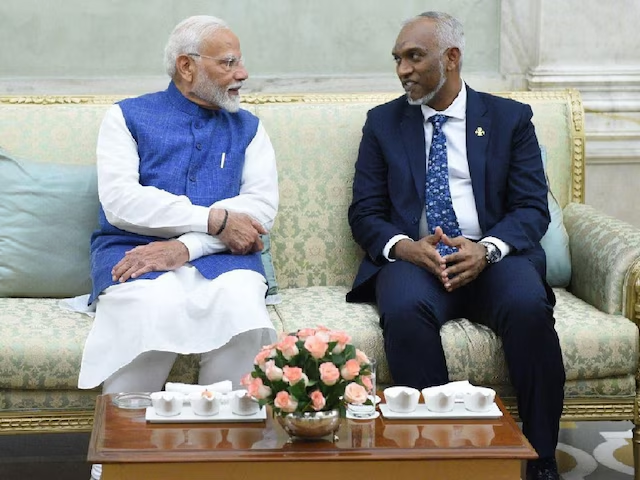8 october 2024 : In just a few months, the Maldives has gone from leading an “India Out” campaign to warmly welcoming India back. After rising to power with an agenda focused on reducing Indian influence, Maldivian President Mohamed Muizzu found himself in New Delhi seeking financial aid. India responded with a substantial bailout package, offering currency swap loans of $400 million and an additional Rs 30 billion.
As the Maldives’ economy faced collapse, it became clear that antagonizing India, the region’s most powerful neighbor, was an unsustainable strategy. This shift in approach carries broader lessons for other South Asian nations like Nepal, Bangladesh, and Sri Lanka, where some politicians have also flirted with aligning more closely with China over India.
In early 2024, tensions between India and the newly elected Maldivian government escalated. Muizzu, who had campaigned on reducing India’s presence in the Maldives, pushed for the removal of Indian military personnel operating two Dornier aircraft, which were donated for humanitarian purposes. This led to further diplomatic spats, including social media insults directed at Prime Minister Modi. These actions resulted in a sharp drop in Indian tourism to the Maldives, causing a $150 million loss, which hit the country hard, as tourism from India is its primary source of income.
Muizzu also made his first foreign visits to Turkey and China, bypassing India, and signed deals such as a $37 million drone agreement with Turkey. His growing closeness to China, coupled with calling India a “bully,” seemed to signal a pivot away from India. However, this strategy faltered as the Maldives faced a severe foreign exchange crisis. In September 2024, the country’s forex reserves had dwindled to just $440 million, enough to cover only one and a half months of imports, prompting a downgrade by major credit-rating agencies.
Realizing that antagonizing India was no longer feasible, Muizzu turned to New Delhi for support. India, ever patient, extended a helping hand. Muizzu visited India in an Indian Air Force aircraft, where India pledged the much-needed financial support through currency swaps. In addition, the two countries agreed to bolster their economic and security cooperation, including the deployment of Indian defense assets in the Maldives.
Muizzu’s about-face isn’t just about immediate financial survival. He now calls India the Maldives’ “closest ally” and has invited Prime Minister Modi for a state visit next year. His government is also launching a campaign to welcome back Indian tourists, hoping to recoup lost revenue.
This swift turnaround in India-Maldives relations serves as a cautionary tale for India’s other neighbors. It illustrates that while China may offer promises, it is India that remains a steadfast and reliable partner. Countries like Nepal, Bangladesh, and Sri Lanka, which often juggle relationships with both India and China, will no doubt take note. Muizzu’s situation underscores that it’s never too late to reconcile with India, which remains committed to its “Neighbourhood First” policy.

